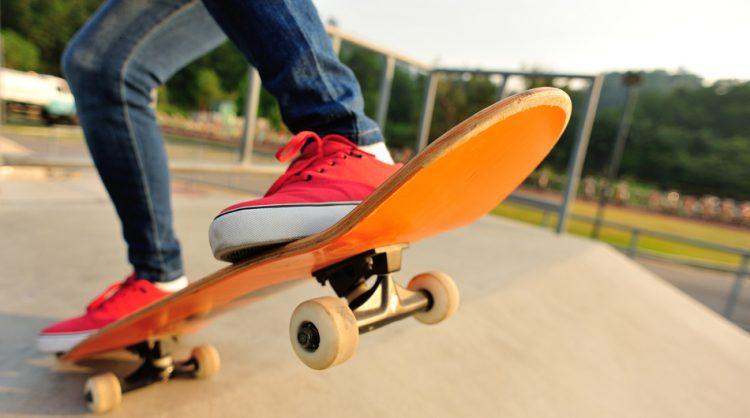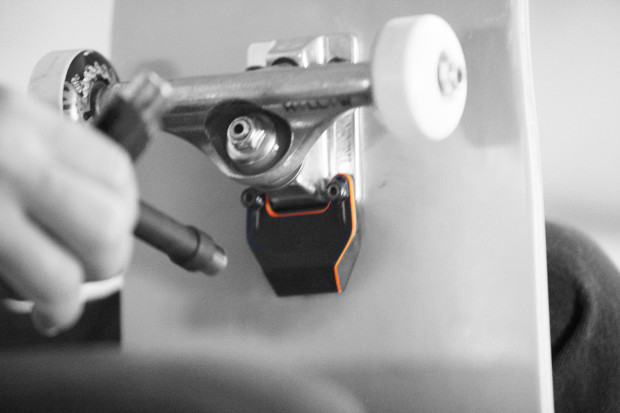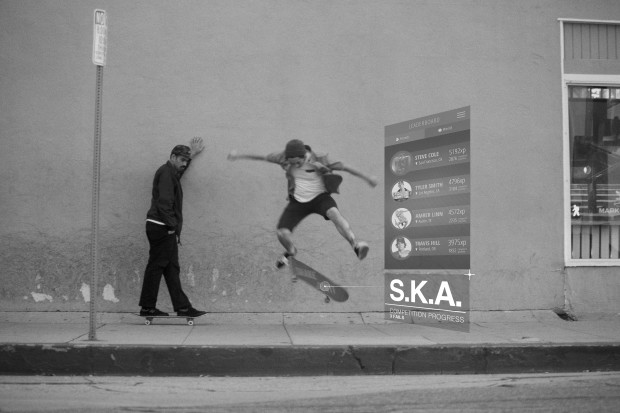
Photo credit: lzflzf / 123RF.
Most of us mere mortals keep our jobs and hobbies in two separate worlds. For engineer-skateboarders Jibin Jose and Abimanyu Nair, that wasn’t good enough.
“From where our journey started, skateboarding wasn’t easy. We come from India, and learning to skate over there is a challenge,” Jibin says in a video. Challenge, he points out, is at the heart of skateboarding.
The duo, co-founders of startup Flipmotion, Inc., are crowdfunding their startup’s first product, RideBlock, a piece of hardware you could easily hold in the palm of your hand that attaches to the bottom of a skateboard. It records the types of tricks you perform and how successful you were at them. For example, it’ll track if you complete a kickflip. But it’ll also track how high your kickflip was and let you share it on social media.
Using the companion app, you can then connect via Bluetooth with other skateboarders and compare tricks. RideBlock can also sense unnamed tricks, so trailblazer skaters can show – and teach – their stunts to others.
The device, US$49 plus shipping, is slated for delivery around September. It’s targeted at US and European markets, where there are the most skateboarders.
RideBlock has a seven-hour battery life, is water and impact resistant, and has a universal mount – it’ll work for both skateboards and longboards, a type of longer and faster skateboard.
See: This sleek skateboard is the world’s hippest electric vehicle
Work and passion

(From left) Jibin and Abimanyu, co-founders of Flipmotion. Photo credit: Flipmotion, Inc.
Jibin received his first skateboard around seventh grade, a small one that took his dad two weeks to get. He grew up in a small town in India’s southern state of Kerala, watching Tony Hawk and the extreme sports competitions like X Games.
Challenge is at the heart of skateboarding.
Jibin and Abimanyu have been developing RideBlock over the past two years as co-founders of Flipmotion. They became friends in engineering college – both attended Toc H Institute of Science and Technology – when they discovered their shared hobby.
“We both loved skateboarding and had a skateboard,” Jibin recalls. “I’d never seen another person really passionate about it.” For the duo, skating was just a fun hobby. They both liked the tangible nature of hardware and worked on a few projects together. In 2014, they were working on a smartwatch for the Indian market, but things weren’t working out.
“We were building a product nobody wants,” Jibin tells Tech in Asia. But they both still had skateboarding as a pastime and found themselves arguing over who was the better skater.
“Even though we both knew it was me, we had an argument,” he says.

RideBlock. Photo credit: Flipmotion, Inc.
They tried to videotape themselves before Abimanyu had the idea of taping a distance sensor to the bottom of his board. Flipmotion’s inception would follow soon after.
Based in Kinfra High Tech Park’s startup village in Kochi, the company also has a base in Los Angeles, where the eight-person team has been testing the product on skaters in partnerships with Make in LA and Flat6Labs’ Abu Dhabi hub (which also happens to have a vibrant underground skate scene). The crew has previously been named a winner of the Next Big Ideas contest, hosted by Zone Startups India and the government of Ontario in Canada.
See: This little electric wheel can Tesla-ify your bike or skateboard
The LA factor

Photo credit: Flipmotion, Inc.
Jibin splits his time between Flipmotion’s development team in Kochi and the marketing and Make in LA accelerator team in Los Angeles. “Being in LA was a huge advantage for us,” he explains. “Everybody loves skateboarding there.” He was able to meet skateboarding pro Dave Bachinsky, who liked RideBlock enough to endorse it, and got feedback on the product from Tony Hawk.
An upside to creating a wearable – besides the co-founders having an affinity for hardware – is to help distinguish it from other skateboarding networks. Skate You and Skateboard Amino have that covered. Wearables in sports, especially activities with a high risk of injury like skateboarding, have plenty of options. Samsung’s BrainBand and the Hiji Band help detect concussions. The Humon Hex straps to an athlete’s thigh and measures glucose, oxygen, energy, and lactic acid to offer information that helps optimize performance.
Skateboard wearable Trace is most similar to RideBlock – down to the seven-hour charge – tracks motion and matches that up to your GoPro’s feed. It costs US$199.
Flipmotion’s team is now working on a graphic interface to give a more visual element to the wearable’s readings.
See: They’re out to prove that sports aren’t just kids’ games – and they just raised funding
This post These engineers love skateboarding so much they created a trick tracker appeared first on Tech in Asia.
from Tech in Asia https://www.techinasia.com/skateboarding-wearable-tracks-tricks-rideblock
via IFTTT
No comments:
Post a Comment